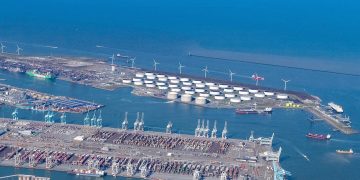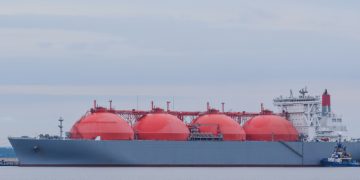In an exclusive interview, Lars Lange, Secretary General of the International Union of Marine Insurance (IUMI), emphasises that while the environmental aspect of ESG has received most of the attention, there are other pressing issues that also deserve focus. To address this, IUMI maintains an “ESG Watchlist” to ensure that critical topics are not overlooked.
For example, IUMI continues to advocate for enhanced fire safety measures on containerships and vessels transporting new energy vehicles.Lange also highlights the importance of keeping pace with emerging technologies. Embracing innovation, he says, is vital for demonstrating that the marine insurance sector is a forward-thinking and dynamic industry—one that offers exciting career opportunities and significant potential for personal development.
SAFETY4SEA: What are the biggest challenges in the marine insurance sector? At this moment, what are your top concerns?
Lars Lange: We see these concerns impacting – or with the potential to impact – marine insurance:
- Geopolitical tension: Physical conflict sometimes puts vessels and their crew in harm’s way or requires operators to re-route their vessels. Insurers are required to adjust their covers to ensure vessels remain adequately insured whatever the impact or outcome. Non-physical tensions such as trade restrictions between nations also impacts on shipping patterns which, in turn, impacts marine insurance.
- Net zero: Insurers must fully understand the impact of new, cleaner technologies so they can provide adequate cover. New, cleaner cargoes – such as battery energy storage systems – are increasingly being carried by sea. These new risks must also be fully understood and insured.
- Vessel safety: Increasing vessel sizes and the potential for onboard fires, particularly on large containerships and car carriers.
- Digitalisation: AI, MASS, cyber risk etc. Digitalisation will enhance future underwriting but its impact on the shipping sector (and the potential risk) must be understood.
S4S: What global policy changes—whether from the IMO or national governments—would most effectively accelerate the transition to zero-emission shipping?
L.L.: Continued and enhanced cooperation between all actors concerned with achieving net-zero for shipping is required for real change to happen. This includes national governments, global supply chains, energy producers, shipping companies and all the associated services, including marine insurers.
S4S: What long-term impact do you anticipate the Poseidon Principles will have on marine insurance as an industry, particularly in terms of risk assessment and underwriting?
L.L.: The Poseidon Principles for Marine Insurance (PPMI) are an important tool to support the maritime industry in achieving the goal of net zero emissions by 2050. The maritime economy is a complex web consisting of many players whose activities are interlinked. Marine insurers are one such stakeholder providing Hull & Machinery cover for vessels which are increasingly using new technologies and fuels to improve their carbon emissions. It is evident that the path to net zero is a long-term objective, at the same time steps must be undertaken today to make progress in the right direction. The third Annual Disclosure Report of the PPMI shows that the portfolios of most signatories are not meeting the required emissions reduction targets yet. This shows that shipowners and their insurers must continue to make progress. A long-term impact of the PPMI is that it highlights the importance of measuring a range of parameters – without measurement, improvements cannot be made.
S4S: How do you plan to engage with other maritime stakeholders, such as ship owners, operators, and regulators, to ensure alignment with the Poseidon Principles and IMO GHG targets?
L.L.: IUMI is a Supporting Partner of the PPMI. Our role is to promote the ambitions of PPMI within the marine insurance community and encourage marine insurance companies to investigate further and consider joining the effort. The underlying principle of the PPMI is to measure, assess and publish the GHG emissions caused by a Hull & Machinery insurer’s covered fleet. IUMI is a Supporting Partner of the PPMI because we believe that such a tangible and concrete approach to addressing the challenge of emissions reduction cannot succeed without measuring one’s own impact. This is an important message we advocate when engaging with maritime stakeholders but the ultimate decision rests with individual insurers.
S4S: Do you believe the maritime industry is on the right path? What key ESG and sustainability trends do you see shaping its future?
L.L.: Sustainability and particularly decarbonisation has gravitated to the top of the agenda of many companies involved in the maritime industry. In other words, the focus has primarily been on the environmental dimension in ESG. Within IUMI, members have raised concerns about modern slavery in global supply chains, including onboard ships. A stronger focus on seafarers’ wellbeing and ensuring safe and appropriate working conditions for those who enable global trade should be deeply entwined in the operations of any organisation involved in the maritime industry. IUMI maintains an “ESG Watchlist” to ensure we remain abreast of all relevant issues.
S4S: How do you envision the relationship between marine insurance and sustainable shipping evolving over the next decade? What role will innovation and technology play in this shift?
L.L.: The two are inextricably linked. Vessel operators must be able to derisk their operations and so insurers must fully understand the new technologies and operational practices in order to provide adequate cover. Marine insurance is changing and is increasingly embracing a range of technical innovations. Many in our sector now take information from a growing range of sources including vessel details and operational history, cargo specifics and shipment information, loss data and the wider contextual environment such as weather, sanctions, high-risk zones and more. Added to this, economic and trade patterns are also being gathered and analysed. As we move into an ever more data-driven world, insurers are beginning to gain access to more granular and real-time information taken from sensors mounted on ships, containers and high value cargo items. This is starting to translate into more accurate risk modelling, pricing and streamlining of claims.
S4S: What changes are needed to enhance the industry’s reputation and attract future talent?
L.L.: Young people pay significant attention to the ethics of the company or industry they work in. It is important to project shipping – and consequently, marine insurance – as a sector working hard to operate at net-zero or beyond. Similarly, our sector must also continue its efforts to become an all-inclusive, fair and non-discriminatory employer. We are conscious that we are competing for talent with other – more glamourous – professions. Embracing technology and innovation will help demonstrate that marine insurance is a forward-thinking, exciting place to work that can deliver a real and exciting career path offering significant opportunities for personal development.
S4S: Do you have any new developments/ or any new projects on the pipeline that you would like to share with the industry?
L.L.: While decarbonisation in shipping is a key priority, safety must not become an afterthought. This is true for new technologies and fuel types, but it is not limited to these. IUMI continues to advocate for improved fire safety onboard containerships and onboard ships carrying new energy vehicles. We are about to launch a new training programme, the Masterclass Hull Insurance. This four-day course, in London, will address the big picture of the maritime industry and where Hull & Machinery insurance fits it. It will look at underwriting tools and how these are impacted by digitalisation and by the changing design of vessels in light of decarbonisation. The programme will also consider risk assessment and underwriting strategies taking into account new cargoes being carried. This comprehensive Masterclass will support our members and encourage them to be forward-looking and ready to face future challenges.
S4S: Looking ahead to 2050, what key message about sustainable shipping would you include in a time capsule for industry stakeholders to reflect on?
L.L.: In 2025, the industry was on the cusp of changing shipping forever. It was an extremely challenging time which required new technologies, new supply chains, new policies and, above all, a coordinated effort and a joining up of nations, companies and people across the globe. I hope that, in 2050, you are looking back on those of us who were working hard to create a cleaner shipping industry and think that we did enough then to allow you to continue the work and reap the benefits today.



























































